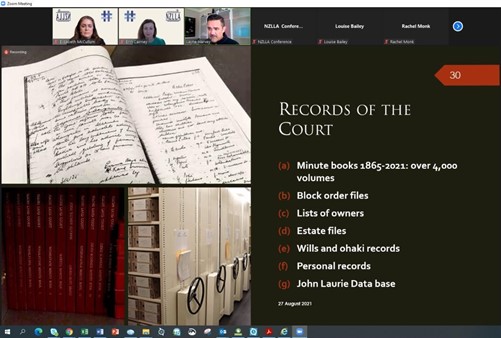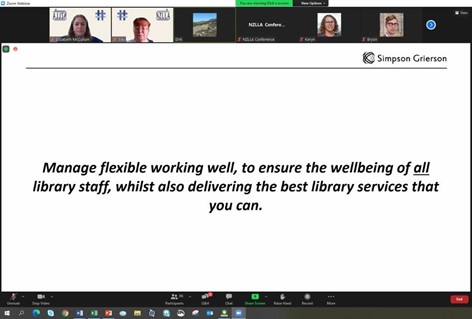New Zealand Law Librarians Association Virtual Conference 2021: Stronger Together
19 4 月 2024
This year, the New Zealand Law Librarians Association conference went digital. In a time of uncertainty and cancelled events, the conference committee at the outset decided on hosting a virtual conference. While the conference was a success and the committee achieved what we had set out to do, we found that there were benefits as well as disadvantages with an entirely online format in comparison to our usual in-person conferences.
Conference title and theme for an online world
The Conference Committee chose the title; ‘Waiho i te toipoto, kaua i te toiroa – Stronger together’. This was based on the whakatauki (Māori proverb) ‘Waiho I te toipoto, kaua i te toiroa’ (let us keep close together and not far apart), as we had been thinking about the difficulties and challenges faced by everyone this past year. Bridging the connections between people becomes more important when we are unable to connect in a physical sense, and extended lockdowns make us feel isolated. In challenging times, maintaining relationships with our colleagues and our wider networks becomes vital. We need to draw on our collegiality and our willingness to help others, our relationships with each other, and the knowledge and skills that we share along with our different professional and cultural backgrounds.
All the conference sessions were held via Zoom, with attendees logging in to join sessions between 11am and 2pm NZST each day from Monday 23 August to Friday 27 August. In total, twelve sessions were presented across the week, from speakers including academics, judges, and law librarians from across a variety of sectors – academic, public, professional services, and private firms.
Benefits of going digital
The decision to be fully online proved to be prescient, as a week prior New Zealand went into a sudden nationwide lockdown due to COVID-19, which continued for a number of weeks. The decisions made by conference committee early on meant that the conference was able to proceed as originally planned.
Costs for hosting an online event are lower than an in-person event which meant that the committee was able to offer free registration to our NZLLA members and also extend this offer to the members of our sister organisations in the UK, Australia, USA, and Canada. This is the first time that we have been able to offer a free conference for the benefit of our members, and the committee is proud to have achieved this with the assistance of sponsorship funds.
Another advantage of going digital was the greater flexibility in constructing the programme, given that our speakers were not constrained by geographic location or time zone. We were able to book a line-up of fantastic presenters from across New Zealand as well as internationally. We welcomed Alison Shea from Cornell University, who presented a topic on US legal research for New Zealand librarians; and Australian Law Librarians Association President Emma Joneshart joined us from Sydney to present on conducting Australian legal research. Particularly useful for attendees was learning how to locate and assess freely available resources for these jurisdictions from experts in their respective fields.

All the sessions were able to be recorded and we made these sessions available on demand for attendees who could not attend some sessions, and for the benefit of our international delegates in different time zones.
Shortcomings of a digital environment
In our planning, we acknowledged there would not be the opportunity for attendees to have a full in-person conference experience and we attempted to correct this shortcoming by planning regional dinners in our three main city centres – Auckland, Wellington, and Christchurch. These had to be postponed due to the national lockdown taking place and we have yet to reschedule these.
Learnings from organizing a digital conference

Feedback was sought post-conference by way of an online survey. We were able to see from the responses what worked well in a digital setting, for instance the scheduling and timing of sessions allowed attendees to engage and avoid ‘Zoom fatigue’! Our overseas attendees appreciated being able to attend an international digital conference. To ensure that we could navigate the Zoom environment with as few hiccups as possible we created detailed daily run sheets and delegated responsibilities between the conference committee. We also conducted test runs with all our speakers in the week before the conference and we had back up plans in case of technical glitches.
 The NZLLA had already been offering monthly general meetings and professional development events via Zoom and other digital platforms. However, this was the largest online event we had ever undertaken, and it was a challenge for the whole conference committee to ensure a success.
The NZLLA had already been offering monthly general meetings and professional development events via Zoom and other digital platforms. However, this was the largest online event we had ever undertaken, and it was a challenge for the whole conference committee to ensure a success.
In a year of cancelled and postponed conferences and professional events, we feel very fortunate we could offer this event to our members. We wish to extend our heartfelt thanks to everyone who made #nzlla2021 happen – the conference committee, regional convenors, members, presenters, sponsors, and attendees.
Written by:
Elizabeth McCullum, Vice-President, New Zealand Law Librarians Association
Louise Bailey, Secretary, New Zealand Law Librarians Association